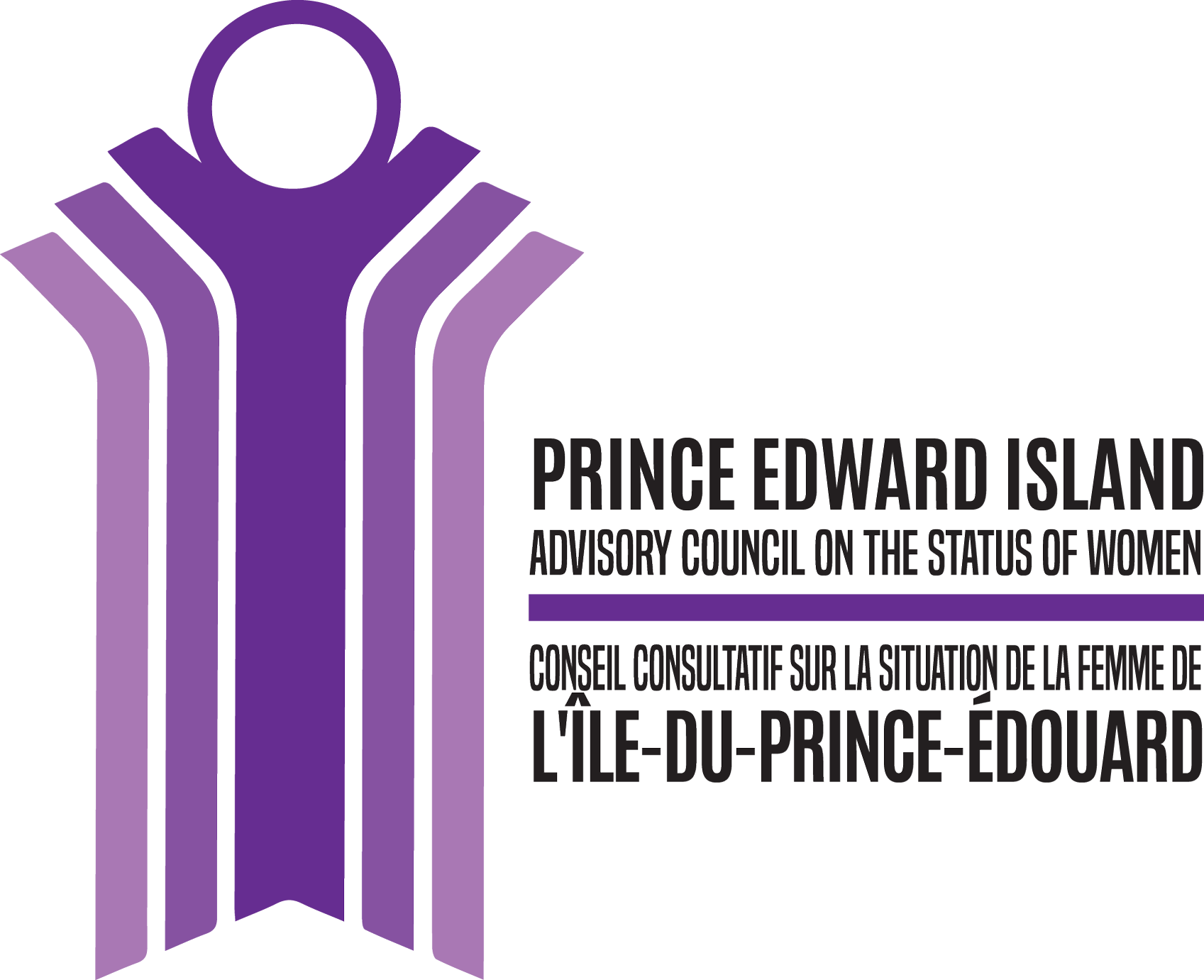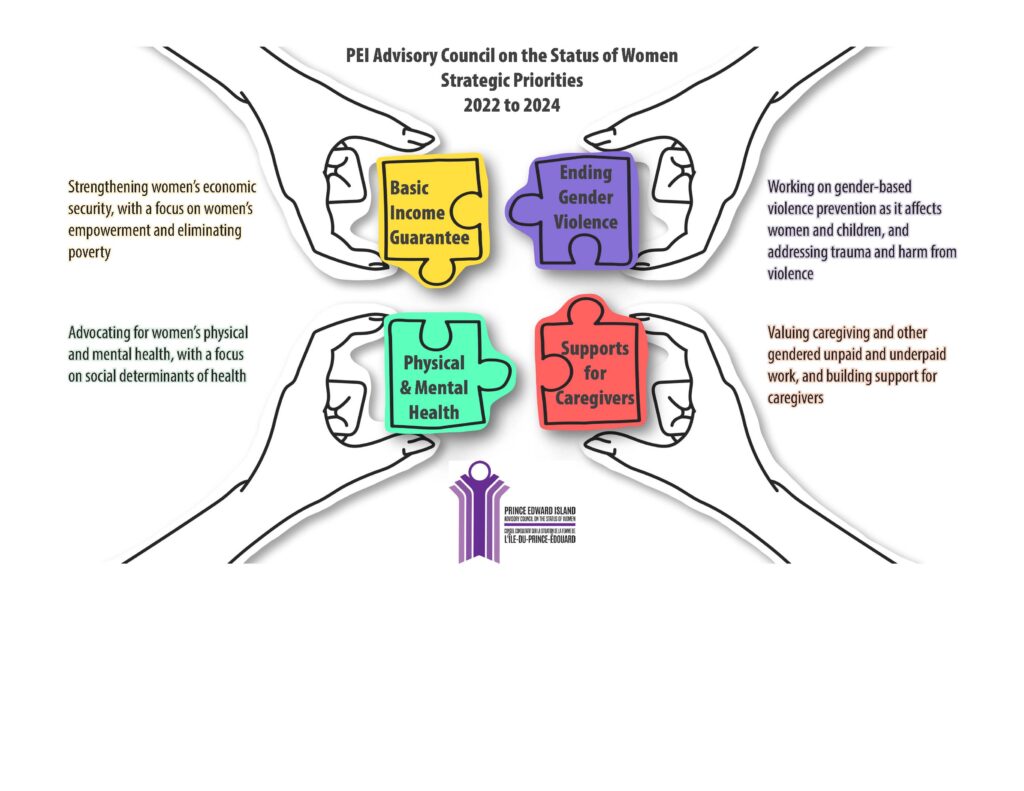Last week, the PEI Advisory Council on the Status of Women was proud to be a co-sponsor of the amazing national conference hosted by Women’s Network PEI, ACT BIG – Advocating Canada Towards Basic Income Guarantee. What better time to look at the history of Council’s advocacy for a basic income guarantee?!
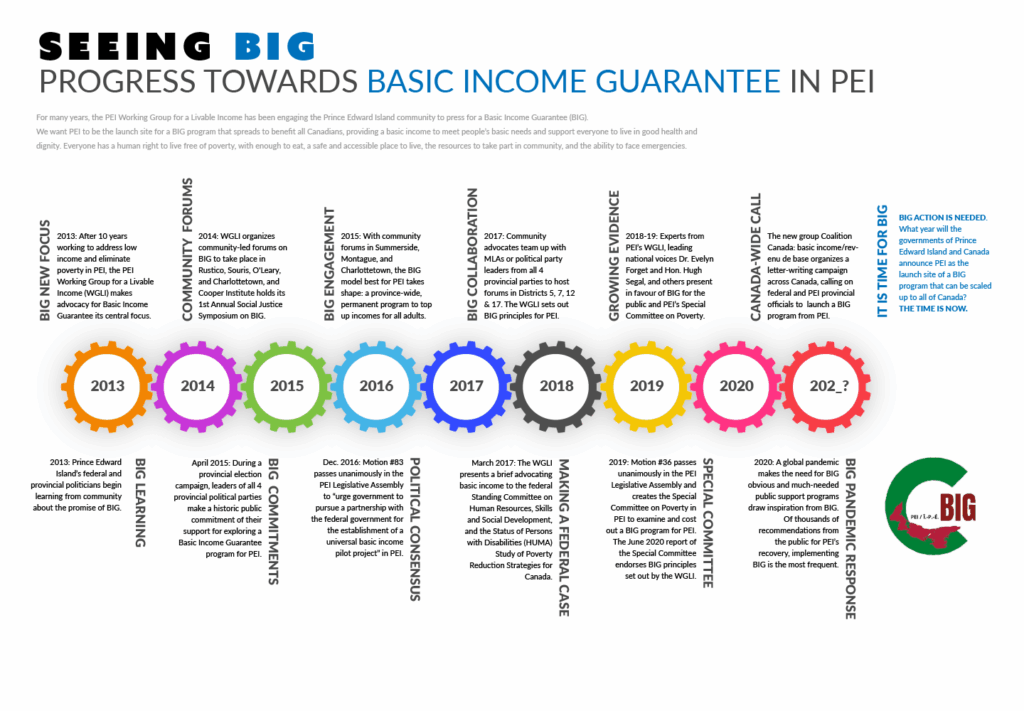 Since it was first established, members of the Advisory Council on the Status of Women recognized poverty as a gender issue and eliminating poverty as crucial to achieving gender equality and improving the status of PEI women and families.
Since it was first established, members of the Advisory Council on the Status of Women recognized poverty as a gender issue and eliminating poverty as crucial to achieving gender equality and improving the status of PEI women and families.

Senator Kim Pate awarded PEI’s leading light on Basic Income Guarantee, Marie Burge, with the King’s Coronation Medal.

Michelle Jay, Trish Altass, Caroline Galloway, and Jane Ledwell at the ACT BIG conference, June 2025
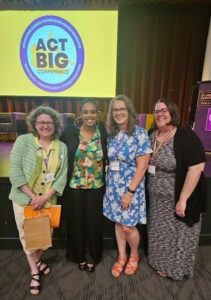
At the ACT BIG conference, Council’s Jane Ledwell, CEO of the Canadian Centre for Women’s Empowerment Meseret Hailyesus, Council’s Michelle Jay, and ED of conference host Women’s Network Jillian Kilfoil.
A major moment in Council’s work to advocate against poverty came in 2004, when the PEI Working Group for a Livable Income and the Council joined, represented at the founding meetings by researcher/policy analyst Patricia MacAulay. The Working Group for a Livable Income emerged as a coalition of allied community organizations and individuals out of a Cooper Institute project on minimum wage, when advocates realized that to achieve livable incomes, we needed to consider all forms of income as essential, and consider the value of all forms of contribution, not just wages and not just paid work. Over the years, this coalition brought together gender equality groups with people with disabilities, advocates for improved social assistance and housing, labour unionists, language minority groups and newcomer groups, arts and culture groups, health researchers and practitioners, social workers, and numerous women’s and gender-equality groups.
From the outset, the Working Group for a Livable Income defined livable income as enough income, from whatever sources, to afford a good quality of life, to live with health and dignity, and to have their basic needs met, not as an act of charity but as a human right. The Working Group and the Advisory Council advocated for improved social assistance rates, livable minimum wages, fair employment standards, and affordable accessible housing. For example, the Advisory Council on the Status of Women’s first Equality Report Card in 2008 called for “Increased allotment of funds for direct payment to social services recipients to bring them up to a standard of living in which all basic needs are met.”
By 2009, the emphasis was shifting to advocacy for government “to consult and collaborate with community-based organizations to develop a Poverty Reduction Strategy like those in other provinces.” Changes were slow to come, including any sign of a poverty “reduction” strategy. Meanwhile, when focus groups were introduced into the Equality Report Card process, participants reminded Council that more transformation was needed than increased social assistance and disability rates. In 2011, they said, “Reducing the stigma on receiving help was very important to focus group participants.”
By 2013, the Working Group for a Livable Income, frustrated with the slow response to calls for a poverty elimination strategy, decided to focus its advocacy on basic income guarantee (also known sometimes as guaranteed basic income, guaranteed livable income, universal basic income, or other names).
The 2013 Equality Report Card demonstrates that the members of the Advisory Council on the Status of Women supported this direction of the Working Group, and they for the first time formally joined the call: “We urge government to build on a grassroots campaign that is in the works to support a basic income guarantee as a realistic and achievable option to eliminate poverty in PEI.”
In 2013, the Working Group for a Livable Income hosted a first round of grassroots community forums that revealed a hunger in the community for justice and rights-based solutions to poverty, and a deep-lived knowledge of the impact basic income guarantee could have.
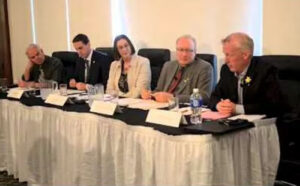
2015 Leaders’ Forum on Women’s Issues: PEI Green leader Peter Bevan-Baker, PEI PC leader Rob Lantz, moderator Jill Lightwood, PEI Liberal leader Wade MacLauchlan, and NDP PEI leader Mike Redmond
By 2015, more community forums confirmed principles of basic income from community members and sharpened the call for a province-wide program. Inspired by this voice from communities across PEI, in 2015 during a provincial election campaign, leaders of all 4 political parties in PEI expressed commitment to pursue basic income guarantee for PEI. The 2015 Report Card focus group participants took note. One said, “Hearing all four leadership candidates commit to exploring basic income guarantee prior to the election was really significant to me. A livable income is a human right, not a luxury.”
Campaign-time support led post-election to the first unanimous motion in the PEI Legislative Assembly. In 2016, Motion #83, to urge government to pursue partnership with the federal government for establishment of a “universal basic income project for PEI.”
In 2017, the PEI Working Group for a Livable Income followed up on advocacy with more community forums, this time engaging party leaders and MLAs from all four provincial political parties as co-hosts of forums in all regions of the province. From this, the Working Group articulated core principles for basic income guarantee.
The 2018 Equality Report Card didn’t let government off the hook for adequate income supports, but also explicitly called for “steps towards implementing a basic income guarantee for all Islanders.” A focus group participant said, “I think you are getting close to a Basic Income Guarantee conversation – it’s important to remember that every political leader voiced support for BIG during the 2015 election. Someone needs to take leadership on this. We are a perfect test site.”
By 2019, after an election that included continued all-party support for the idea of basic income guarantee, the PEI Legislative Assembly established a Special Committee on Poverty in PEI, with a mandate to examine and cost out a model for a basic income guarantee for PEI. (This committee was chaired by Trish Altass, then an MLA, previously a member of the Working Group for a Livable Income, and now our very own research coordinator!) The Special Committee heard from local and national experts. The Committee’s work endorsed the core principles the Working Group for a Livable Income set out, and in June 2020, they released a report for a costed model of basic income guarantee that was unanimously adopted by all parties.
By 2022’s Equality Report Card, the Advisory Council on the Status of Women was calling for implementation of a basic income guarantee model – and Council’s Strategic Plan additionally included Basic Income Guarantee as the core focus of our work for poverty elimination. Basic Income Guarantee remains one of our four priority issue areas on the 2024-2027 Strategic Plan. We are also, through Trish, part of Coalition Canada – basic income guarantee revenu de base, which developed an irrefutable model for guaranteed basic income benefit for PEI, a program scalable to all of Canada!
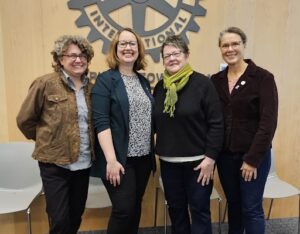
In November 2023, Council staff members all celebrated the release of Coalition Canada’s PEI proposal for a guaranteed Livable Income, which Trish helped develop.
In the words of a focus group participant in 2022: “It was very promising there was a model [for basic income guarantee] presented in the Legislature, the whole house voted on it, and it was very exciting. … As time goes on, we’re going to lose that momentum and PEI’s chance to lead the country for once, and help people who live here.”
